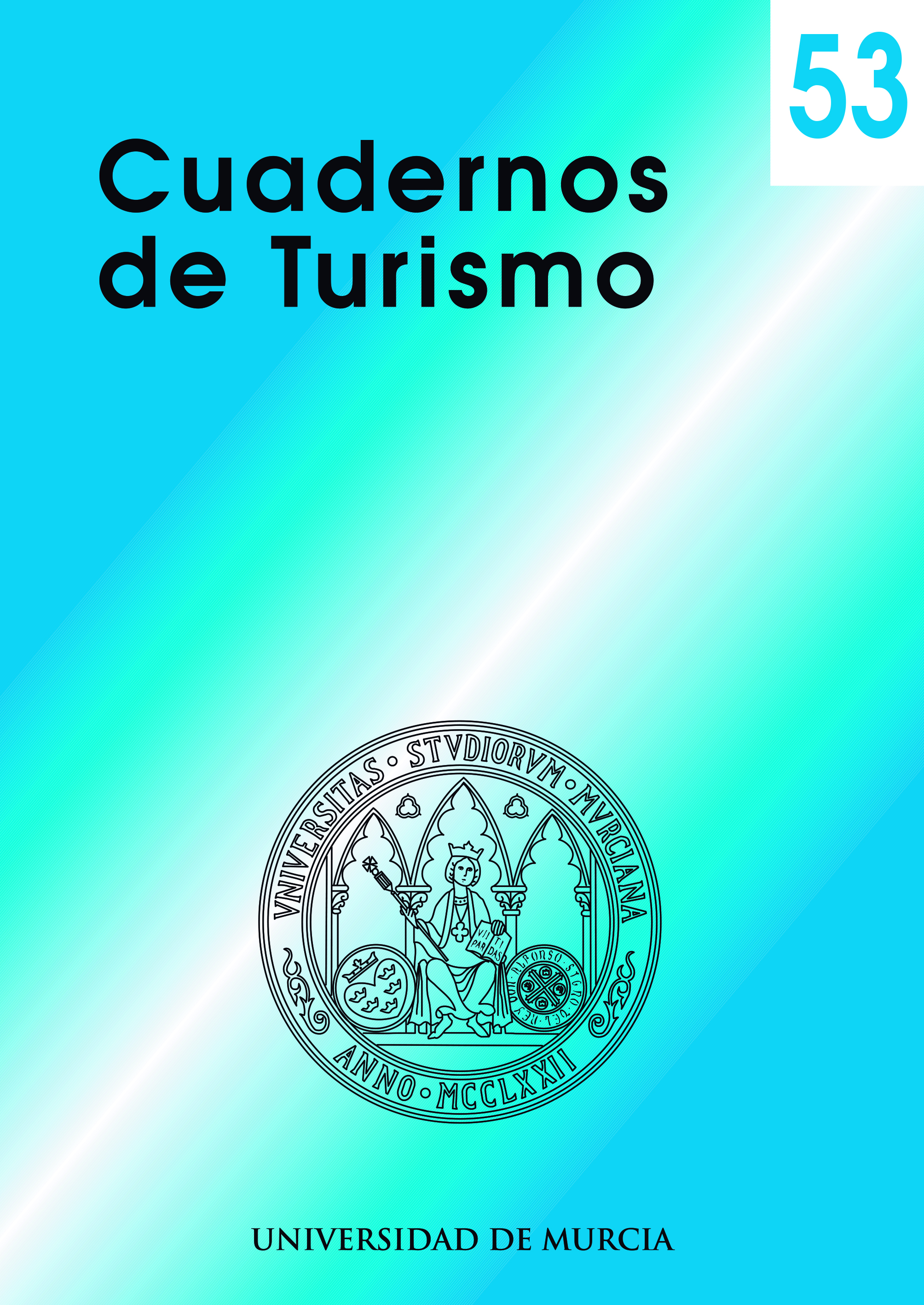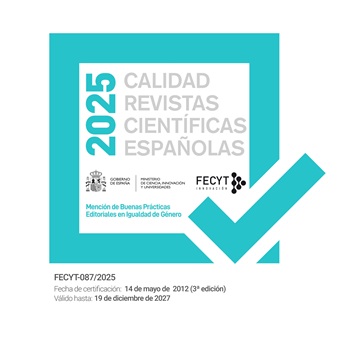SLOW TOURISM: TOURIST MOTIVATIONS BASED ON PERSONALITY TRAITS AND SOCIO-DEMOGRAPHIC VARIABLES
Abstract
The aim of this study is to analyze tourist motivations and the choice of the slow tourism modality based on personality traits, age, gender, income level and the effects that the pandemic. 192 people with previous tourist experiences with an age range between 23 and 65 years (X = 44.49; SD = 13.24) participated. Differences have been found in the motivations to travel, so that at a lower age and income level, hedonistic motivation predominates. The relationship between Extraversion with social motivation and Openness with monumental motivations is confirmed.
Downloads
-
Abstract1471
-
PDF (Español (España))1399
-
PDF1399
References
AMERICAN PSYCHOLOGICAL ASSOCIATION (2010): «Enmiendas de 2010 a los “Principios Éticos de los Psicólogos y Código de Conducta” de 2002», American Psychologist, vol. 65 (5), pp. 493.
ANDRADE, M.J. (2012): «Los factores personales como variables determinantes en la formación de la imagen del destino. Especial referencia a las motivaciones turísticas», Teoría y Praxis, nº 11, pp. 10-39. https://doi.org/10.22403/uqroomx/typ11/01
ASOCIACIÓN MÉDICA MUNDIAL (1964): Declaración de Helsinki. AMM. http://www.conamed.gob.mx/prof_salud/pdf/ helsinki.pdf
BARRERA, C., y BAHAMONDES, R. (2012): «Turismo Sostenible: importancia en el cuidado del medio ambiente. RIAT: Revista Interamericana de Medioambiente y Turismo, vol. 8 (1), pp. 50-56. https://doi.org/10.4067/riatvol8iss1pp50-56
BUDDEN, H. L., JONES, M.A., ROOT, T. y BUDDEN, M.C. (2022): «Gender-based consumer behavior impacts of a pandemic: two semesters», European Journal of Education and Pedagogy, vol. 3 (6), pp. 19-23. https://doi.org/10.24018/ejedu.2022.3.6.409
CAIZA, C. y ANDRADE, W.P. (2023): «El turismo slow como alternativa para el desarrollo sostenible en la comunidad del milenio A´I Cofan Dureno al 2030», Revista Ecos De La Academia, vol. 8 (16), pp. 59-79. https://doi.org/10.53358/ecosacademia.v8i16.807
CALZATI, V. y DE SALVO, P. (2018): «Slow tourism. A theoretical framework». En M. Clancy (Ed.), Slow Tourism, Food and Cities. Plance and the Search for the “Good Life”. New York, Routledge, pp. 33-49.
CATTELL, R. (1972): El análisis científico de la personalidad. Barcelona, Fontanella.
CHUNG, J.Y., KIM, J S., LEE, C.K. y KIM, M.J. (2018): «Slow-food-seeking behaviour, authentic experience, and perceived slow value of a slow-life festival», Current Issues in Tourism, vol. 21 (2), pp. 123-127. https://doi.org/ 10.1080/13683500.2017.1326470
CLONINGER, S. C. (2002): Teorías de la personalidad. Madrid, Pearson Educación.
CONDE-RUIZ, J.I. y GONZÁLEZ, C.I. (2021): «El proceso de envejecimiento en España». En: FEDEA, Estudios sobre la Economía Española. Caja Rural Intermediterránea y Cajamar, pp. 73-96.
COSTA, P.T. y MCCRAE, R.R. (2008): Inventario de Personalidad NEO Revisado (NEO PI-R). Inventario NEO reducido de Cinco Factores (NEO-FFI). Manual. 3ª edición. TEA.
CRESPO, J.A. y SORIA, B.W. (2019): «Factores que influyen en el comportamiento del turista: estado de la cuestión», Kalpana. Revista de Investigación, nº 17, pp. 120-136
CUENCA, M. y GOYTIA, A. (2012): «Ocio experiencial: antecedentes y características», Arbor, vol. 188 (754), pp. 265-281. https://doi.org/10.3989/arbor.2012.754n2001
DE LUIS, A. (2011): «Una aproximación al turismo Slow. El turismo Slow en las Cittaslow de España», Investigaciones Turísticas, nº 1, pp. 122-133. https://doi.org/10.14198/inturi2011.1.08
DÍAZ, G.S.L. y ESPADA, J.S. (2021): «Perfil, motivación y satisfacción del visitante turístico: el caso de Cuenca, ciudad patrimonio de la humanidad», Ayana. Revista de Investigación en Turismo, vol. 1 (2), pp. 1-20. https://doi.org/10.24215/27186717e009
DÍAZ, A.B.V. y TUASA, L.J.S. (2022): «Desarrollo del turismo interno para aliviar el estrés colectivo en la ciudad de Guayaquil», Código Científico Revista de Investigación, vol. 3 (3), pp. 62-73
DICKINSON, J. y LUMSDON, L. (2010): Slow Travel and Tourism. London, Earthscan.
ESLAMI, F. y NAMDAR, R. (2022): «Social, Environmental and economic impact assessment of COVID-19 on rural tourism», Frontiers in Public Health, vol. 10, p. 883277. https://doi.org/10.3389/fpubh.2022.883277
GARCÊS, S., POCINHO, M., DE JESUS, S.N. y RIEBER, M.S. (2018): «Positive psychology and tourism: a systematic literature review», Tourism & Management Studies, vol. 14 (3), pp. 41-51. https://doi.org/10.18089/tms.2018.14304
GARCÍA, M. y MORAL, M.V. (2022): «Motivación para viajar y satisfacción turística en función de los factores de personalidad», PASOS. Revista de Turismo y Patrimonio Cultural, vol. 20 (1), pp. 31-44. https://doi.org/10.25145/j.pasos.2022.20.002
GIL, S., BEERLI, A. y DE LEÓN, J. (2012): «Entender la imagen de un destino turístico: factores que la integran y la influencia de las motivaciones», Criterio Libre, vol. 10 (16), pp. 115-142. https://doi.org/10.18041/1900-0642/criteriolibre.2012v10n16.1166
GODOVYKH, M., PIZAM, A. y BAHJA, F. (2021): «Antecedents and outcomes of health risk perceptions in tourism, following the COVID-19 pandemic», Tourism Review, vol. 76 (4), pp. 737-748. https://doi.org/10.1108/tr-06-2020-0257
GUAPI-GUAMÁN, F.I., MORENO-MANZO, J.S. y CHÉRREZ-BAHAMONDE, R.C. (2020): «El turismo experiencial, deportes y juegos tradicionales: Nueva perspectiva para el desarrollo turístico local», Revista Arbitrada Interdisciplinaria Koinonía, vol. 5 (10), pp. 904-914. https://doi.org/10.35381/r.k.v5i10.884
HIDALGO-ALCÁZAR, M.C., SICILIA, M. y RUIZ, S. (2015): «La Imagen de un Producto Turístico Rural a través del Acceso al Contenido Generado por otros Usuarios en Internet: Diferencias por Género», Journal of Technology Management & Innovation, vol. 10 (3), pp. 75-84. https://doi.org/10.4067/s0718-27242015000300009
HUANG, T.Y., CHEN, J.S. y RAMOS, W.D. (2023): «Slow tourism: the relationship between tourists’ slow food experiences and their quality of life», Tourism Review, vol. 78 (1), pp. 159-176. https://doi.org/10.1108/TR-02-2022-0053
KALMUS, V., REALO, A. y SIIBAK, A. (2011): «Motives for Internet use and their relationships with personality traits and socio-demographic factors», Trames, vol. 15 (4), pp. 385-403. https://doi.org/10.3176/tr.2011.4.04
KRIPPENDORF, J. (1984): The Holiday Maker: Understanding the Impact of Leisure and Travel. Berlín, Butterworth-Heinemann Ltd.
LAN, F., HUANG, Q., ZENG, L., GUAN, X., XING, D. y CHENG, Z. (2021): «Tourism experience and construction of personalized smart tourism program under tourist psychology», Frontiers in Psychology, vol. 12, pp. 1-13. https://doi.org/10.3389/fpsyg.2021.691183
LEUNG, R. y LAW, R. (2010): «A review of personality research in the tourism and hospitality context», Journal of Travel & Tourism Marketing, vol. 27 (5), pp. 439-459. https://doi.org/10.1080/10548408.2010.49905
LOHMANN, M. y DANIELSSON, J. (2001): «Predicting travel patterns of senior citizens: How the past may provide a key to the future», Journal of Vacation Marketing, vol. 7 (4), pp. 357-366. https://doi.org/10.1177/135676670100700405
LÓPEZ, G.S. y SASTRE, J. (2021): «Perfil, motivación y satisfacción del visitante turístico», Ayana, vol. 1 (2), pp. 1-20. https://doi.org/10.24215/27186717e009
MANCINI, J.A. (2015): «Turismo Slow: una nueva tendencia turística», TURYDES: Revista sobre Turismo y Desarrollo Local Sostenible, vol. 8 (18), pp. 1-17.
MCCRAE, R.R. y COSTA, P.T. (1994): «The stability of personality: observations and evaluations», Current Directions in Psychological Science, vol. 3 (6), pp. 173-175. https://doi.org/10.1111/1467-8721.ep10770693
MCCRAE, R.R. y COSTA, P.T. (2003): Personality in Adulthood: A Five-factor Theory Perspective. London, The Guilford Press.
MCCRAE, R.R. y SUTIN, A.R. (2009): «Openness to experience». En M. R. Leary y R. H. Hoyle (Eds.), Handbook of individual differences in social behavior. Guilford, pp. 57-273.
MEDINA-OJEDA, N., MARTÍN-SANTANA, J.D. y MEDINA-MUÑOZ, D.R. (2019): «La personalidad del turista como criterio de segmentación de destinos de sol y playa: una aplicación al destino Gran Canaria», Cuadernos de Turismo, nº 44, pp. 247-275. https://doi.org/10.6018/turismo.44.404831
MOGHAVVEMI, S., WOOSNAM, K.M., HAMZAH, A. y HASSANI, A. (2021): «Considering residents’ personality and community factors in explaining satisfaction with tourism and support for tourism development», Tourism Planning and Development, vol. 18 (3), pp. 267-293. https://doi.org/10.1080/21568316.2020.1768140
MUNNÉ, F. (1980): Psicosociología del tiempo libre: Un enfoque crítico. México, Trillas.
NAVARRO, D. (2015): «Recursos turísticos y atractivos turísticos: conceptualización, clasificación y valoración», Cuadernos de Turismo, nº 35, pp. 335-357. https://doi.org/10.6018/turismo.35.221641
NEME-CHAVES, S.R., FORERO-MOLINA, S.C. y ORTIZ, L.V.L. (2023): «Modelo de la conducta planificada para la promoción del turismo civilizado: Caso Villa de Leyva (Boyacá, Colombia)», Revista CEA, vol. 9 (19), e2469. https://doi.org/10.22430/24223182.2469
ORGANIZACIÓN MUNDIAL DEL TURISMO (2019): Definiciones de turismo de la OMT. https://doi.org/10.18111/9789284420858
OSUNA, R.S., CUEVAS, T.J., DÍAZ, B.H. y GARCÍA, G. (2022): «Aproximación teórica al Turismo Sénior». En N.L. Marenzana (Ed.), Realidad, Tendencias y Desafío (CONDET). Facultad de Turismo de la Universidad de Comahue, pp. 127-141.
PASSAFARO, P., CHIAROLANZA, C., AMATO, C., BARBIERI, B., BOCCI, E. y SARRICA, M. (2021): «Outside the comfort zone: what can psychology learn from tourism (and vice versa)», Frontiers in Psychology, vol. 12, 650741. https://doi.org/10.3389/fpsyg.2021.650741
PETRINI, C. (2010): Terra Madre: Forging a New Global Network of Sustainable Food Communities. USA, Chelsea Green Publishing.
PORTELA, N. (2021): Post-pandemia y Turismo slow: Análisis y estudios empíricos. Trabajo de Fin de Máster. Universidad de A Coruña.
RIVERA, J. y PASTOR, R. (2020): «¿Hacia un turismo más sostenible tras el COVID-19? Percepción de las agencias de viajes españolas», Gran Tour; Revista de Investigaciones Turísticas, nº 21, pp. 206-229.
RIVERA, M. (2012): «Turismo responsable y relaciones interculturales en el contexto de la globalización». En L. Rodríguez y A.R. Roldán (Eds.), Interculturalidad: un enfoque interdisciplinar. Universidad de Córdoba, pp. 181-205.
RIVERA, M. (2013): «El turismo experiencial como forma de turismo responsable e intercultural». En L. Rodríguez y A.R. Roldán (Eds.), Relaciones culturales en la diversidad. Universidad de Córdoba, pp. 199-217.
ROBERTS, B.W., JACKSON, J.J., FAYARD, J.V., EDMONDS, G. y MEINTS, J. (2009): «Conscientiousness». En M. Leary y R. Hoyle (Eds.), Handbook of Individual Differences in Social Behavior. London, Guilford Press, pp. 257-273.
RODRÍGUEZ, J. y AGULLÓ, E. (2002): «Psicología social y ocio: una articulación necesaria», Psicothema, vol. 14 (1), pp. 124-133.
ROTHBART, M.K., AHADI, S.A. y EVANS, D. E. (2000): «Temperament and personality: Origins and outcomes», Journal of Personality and Social Psychology, vol. 78 (1), pp. 122-135. https://doi.org/10.1037/0022-3514.78.1.122
SAN MARTÍN, J.E. (1997): Psicología del ocio y del turismo. Málaga, Aljibe.
TALWAR, S., SRIVASTAVA, S., SAKASHITA, M., ISLAM, N. y DHIR, A. (2021): «Personality and travel intentions during and after the COVID-19 pandemic: an artificial neural network (ANN) approach», Journal of Business Research, vol. 142, pp. 400-411. https://doi.org/10.1016/j.jbusres.2021.12.002
TAN, W. y TANG, C. (2013): Does personality predict tourism information search and feedback behaviour?, Current Issues in Tourism, vol. 16 (4), pp. 388-406. https://doi.org/10.1080/13683500.2013.766155
TINSLEY, H.E.A. y TINSLEY, D.J. (1986): «A theory of the attributes, benefits, and causes of leisure experience», Leisure Sciences, vol. 8 (1), pp. 1-45. https://doi.org/10.1080/01490408609513056
VALDIVIA, S., DÍAZ J. y VIDAL, D. (2023): «Aproximación teórica al turismo slow. Ensayo», Realidad, Tendencias y Desafíos en Turismo (CONDET), vol. 20 (2), pp. 71-82.
WILT, J. y REVELLE, W. (2009): «Extraversion». En M. Leary y R. Hoyle (Eds.), Handbook of individual differences in social behavior. London, Guilford Press, pp. 27-45.
Las obras que se publican en esta revista están sujetas a los siguientes términos:
1. El Servicio de Publicaciones de la Universidad de Murcia (la editorial) conserva los derechos patrimoniales (copyright) de las obras publicadas, y favorece y permite la reutilización de las mismas bajo la licencia de uso indicada en el punto 2.
2. Las obras se publican en la edición electrónica de la revista bajo una licencia Creative Commons Reconocimiento-NoComercial-SinObraDerivada 3.0 España (texto legal). Se pueden copiar, usar, difundir, transmitir y exponer públicamente, siempre que: i) se cite la autoría y la fuente original de su publicación (revista, editorial y URL de la obra); ii) no se usen para fines comerciales; iii) se mencione la existencia y especificaciones de esta licencia de uso.
3. Condiciones de auto-archivo. Se permite y se anima a los autores a difundir electrónicamente las versiones pre-print (versión antes de ser evaluada) y/o post-print (versión evaluada y aceptada para su publicación) de sus obras antes de su publicación, ya que favorece su circulación y difusión más temprana y con ello un posible aumento en su citación y alcance entre la comunidad académica. Color RoMEO: verde.





_.jpg)








